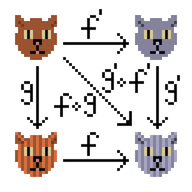Foldable
Foldable type class instances can be defined for data structures that can be folded to a summary value.
In the case of a collection (such as List or Set), these methods will fold
together (combine) the values contained in the collection to produce a single
result. Most collection types have foldLeft methods, which will usually be
used by the associated Foldable[_] instance.
Foldable[F] is implemented in terms of two basic methods:
foldLeft(fa, b)(f)eagerly foldsfafrom left-to-right.foldRight(fa, b)(f)lazily foldsfafrom right-to-left.
These form the basis for many other operations, see also: A tutorial on the universality and expressiveness of fold
scala> import cats._
import cats._
scala> import cats.std.all._
import cats.std.all._
scala> Foldable[List].fold(List("a", "b", "c"))
res0: String = abc
scala> Foldable[List].foldMap(List(1, 2, 4))(_.toString)
res1: String = 124
scala> Foldable[List].foldK(List(List(1,2,3), List(2,3,4)))
res2: List[Int] = List(1, 2, 3, 2, 3, 4)
scala> Foldable[List].reduceLeftToOption(List[Int]())(_.toString)((s,i) => s + i)
res3: Option[String] = None
scala> Foldable[List].reduceLeftToOption(List(1,2,3,4))(_.toString)((s,i) => s + i)
res4: Option[String] = Some(1234)
scala> Foldable[List].reduceRightToOption(List(1,2,3,4))(_.toString)((i,s) => Later(s.value + i)).value
res5: Option[String] = Some(4321)
scala> Foldable[List].reduceRightToOption(List[Int]())(_.toString)((i,s) => Later(s.value + i)).value
res6: Option[String] = None
scala> Foldable[Set].find(Set(1,2,3))(_ > 2)
res7: Option[Int] = Some(3)
scala> Foldable[Set].exists(Set(1,2,3))(_ > 2)
res8: Boolean = true
scala> Foldable[Set].forall(Set(1,2,3))(_ > 2)
res9: Boolean = false
scala> Foldable[Set].forall(Set(1,2,3))(_ < 4)
res10: Boolean = true
scala> Foldable[Vector].filter_(Vector(1,2,3))(_ < 3)
res11: List[Int] = List(1, 2)
scala> Foldable[List].isEmpty(List(1,2))
res12: Boolean = false
scala> Foldable[Option].isEmpty(None)
res13: Boolean = true
scala> Foldable[List].nonEmpty(List(1,2))
res14: Boolean = true
scala> Foldable[Option].toList(Option(1))
res15: List[Int] = List(1)
scala> Foldable[Option].toList(None)
res16: List[Nothing] = List()
scala> def parseInt(s: String): Option[Int] = scala.util.Try(Integer.parseInt(s)).toOption
parseInt: (s: String)Option[Int]
scala> Foldable[List].traverse_(List("1", "2"))(parseInt)
res17: Option[Unit] = Some(())
scala> Foldable[List].traverse_(List("1", "A"))(parseInt)
res18: Option[Unit] = None
scala> Foldable[List].sequence_(List(Option(1), Option(2)))
res19: Option[Unit] = Some(())
scala> Foldable[List].sequence_(List(Option(1), None))
res20: Option[Unit] = None
scala> Foldable[List].dropWhile_(List[Int](2,4,5,6,7))(_ % 2 == 0)
res21: List[Int] = List(2, 4, 5, 6, 7)
scala> Foldable[List].dropWhile_(List[Int](1,2,4,5,6,7))(_ % 2 == 0)
res22: List[Int] = List(2, 4, 5, 6, 7)
scala> val FoldableListOption = Foldable[List].compose[Option]
FoldableListOption: cats.Foldable[[α]List[Option[α]]] = cats.Foldable$$anon$1@3a0b1aa5
scala> FoldableListOption.fold(List(Option(1), Option(2), Option(3), Option(4)))
res23: Int = 10
scala> FoldableListOption.fold(List(Option(1), Option(2), Option(3), None))
res24: Int = 6
scala> FoldableListOption.fold(List(Option("1"), Option("2"), Option("3"), None))
res25: String = 123
Hence when defining some new data structure, if we can define a foldLeft and
foldRight we are able to provide many other useful operations, if not always
the most efficient implementations, over the structure without further
implementation.
Note that, in order to support laziness, the signature of Foldable's
foldRight is
def foldRight[A, B](fa: F[A], lb: Eval[B])(f: (A, Eval[B]) => Eval[B]): Eval[B]
as opposed to
def foldRight[A, B](fa: F[A], z: B)(f: (A, B) => B): B
which someone familiar with the foldRight from the collections in Scala's standard
library might expect.
